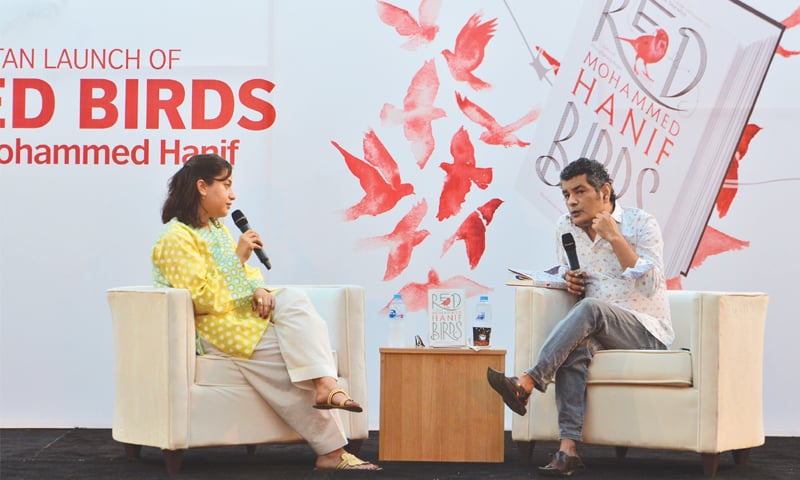KARACHI: Mohammed Hanif the author, journalist and unwilling social and political commentator was his usual engaging self at the launch of his latest book, Red Birds, at the British Council library on Sunday.
Red Birds, Hanif’s third novel, was described by him as a “family story living in a post-war type world, which we all are. There’s a war, a family trying to survive in a refugee camp of sorts; it is also about a boy who has gone missing, and a dog that has things to say to us and about us”.
Interviewing him was Sanam Maher, author of The Sensational Life & Death of Qandeel Baloch, who probed just enough for Hanif to reveal intriguing titbits about his inspiration, writing process, and his trajectory and evolution as a writer.
‘We seem to have returned to the glorious days of censorship’
A Booker longlisted, and DSC prize shortlisted writer, Hanif shared the “lonely process of writing a novel process which was published after a seven-year gap. There was a time when people around me started to die, and these deaths were unexpected. I was in strange grieving state of mind. One tends to be in the middle of conversations with people, arguments and fights that never end when all of a sudden the person is no longer. Their last messages are still there including promises and plans. I began to wonder if somebody dies, do they also take a part of us with them? Do we remain the same person? And so Red Birds came out as a result of me trying to figure out this period.”
Hanif’s novels are almost always entrenched in Pakistani society. His first, The Case of Exploding Mangoes, tapped
into the mysterious death of Ziaul Haq; Our Lady of Alice Bhatti presented the tale of Karachi through the eyes of a Christian nurse. Red Birds too is inspired by events at home but Hanif opts for a different approach.
The novel is set in an unnamed desert location; there is a boy who has gone missing, a topic that Hanif has researched and written on extensively. There is talk about a refugee camp where things and futures are stolen by those in official capacities who fill the necessary paperwork to justify their stealing. But Red Birds is much less revealing than Hanif’s previous books and a lot is unsaid for the reader to determine.
“Everybody reads a slightly different book, and remembers differently and draws different conclusions. Every reader will bring his own politics and his own prejudices when reading a book,” he reasoned why.
It took some cajoling for Hanif to delve into the current social and political climate of Pakistan. And one topic touched upon was that of censorship.
“Writers and journalists should not be required to be brave. However, we seem to have returned to the glorious days of censorship which is so crude and it is said to be worse than during martial laws the country has experienced,” he said.
So has it had an impact on him as a writer and columnist? “Even if I want to write whatever I want, in the last few months I have started to think about the person who will be held responsible for publishing my writing. I don’t want to make more trouble for him; you do start thinking about organisations, and people who are already in trouble and that is how self censorship works. You start pulling back in your head.”
He also spoke about his research on missing persons which resulted in his publication The Baloch who is Not Missing and Others Who Are. “First there only used to be talk about the Baloch missing. Now there are boys from Lahore, Karachi, interior of Sindh and many from KP who are missing. This is an alarming situation in Pakistan where there seems to be no legal process that prosecutes people for alleged crimes and instead just throws them into dungeons and expect their families to forget.”
Published in Dawn, December 3rd, 2018















































Dear visitor, the comments section is undergoing an overhaul and will return soon.